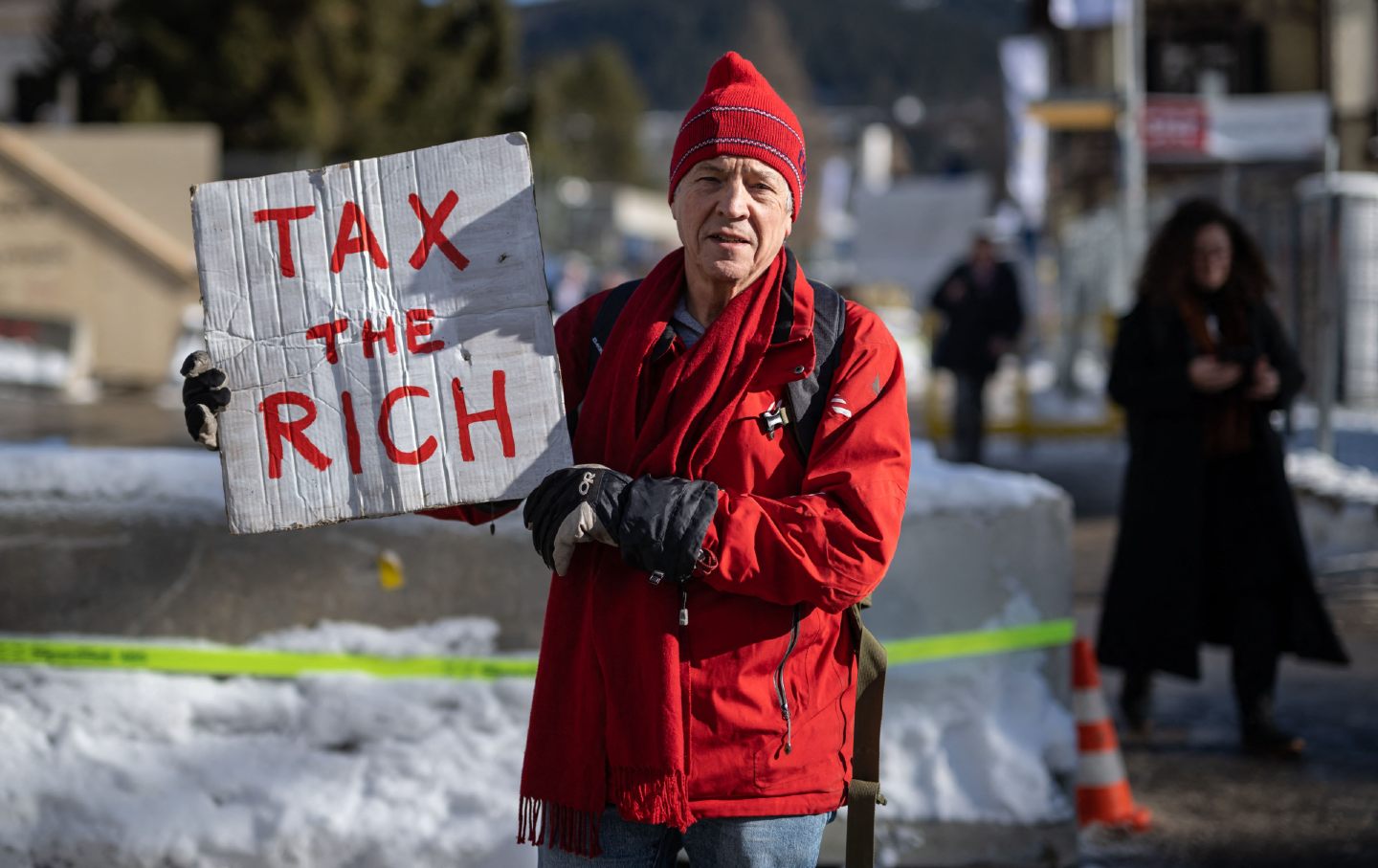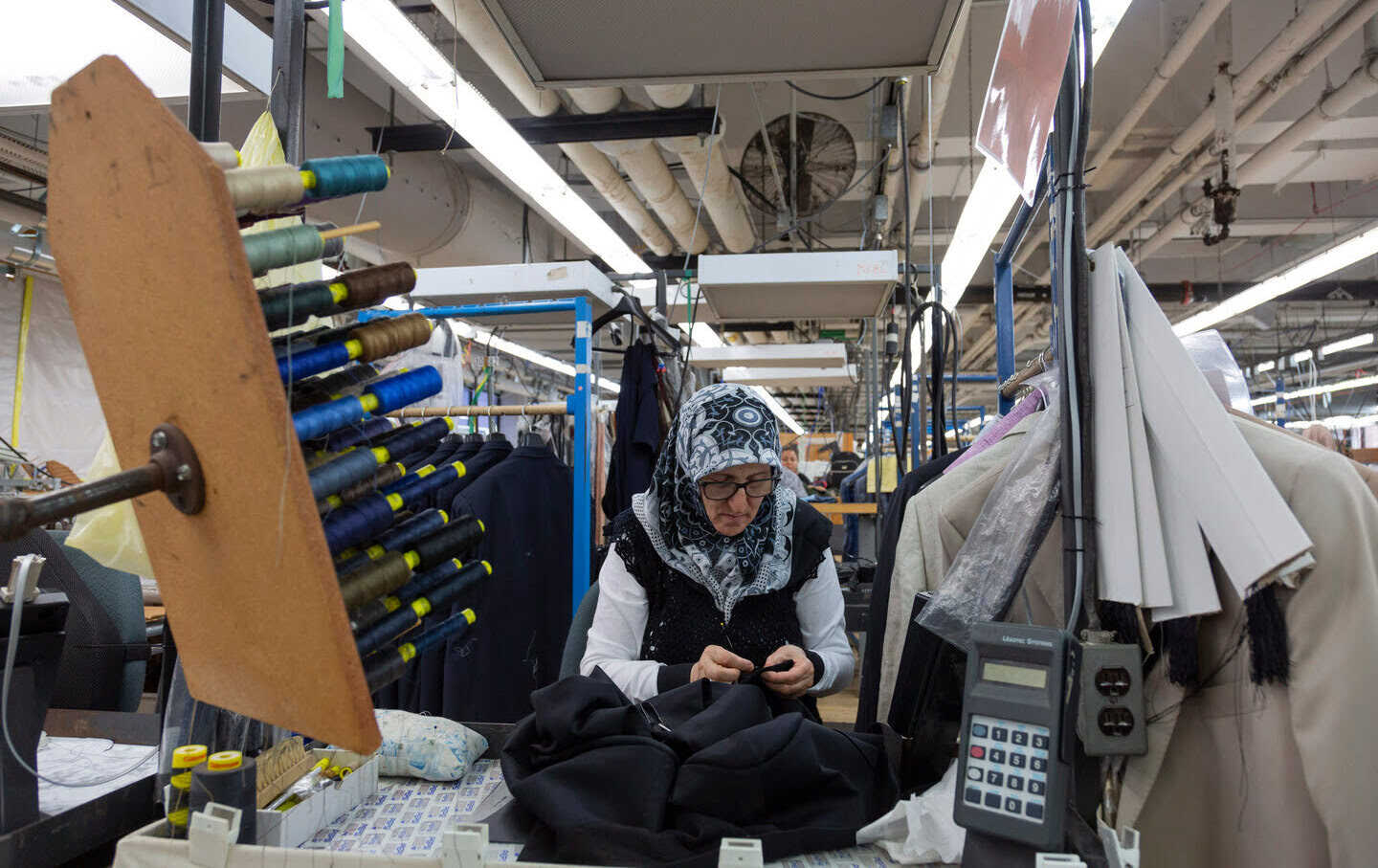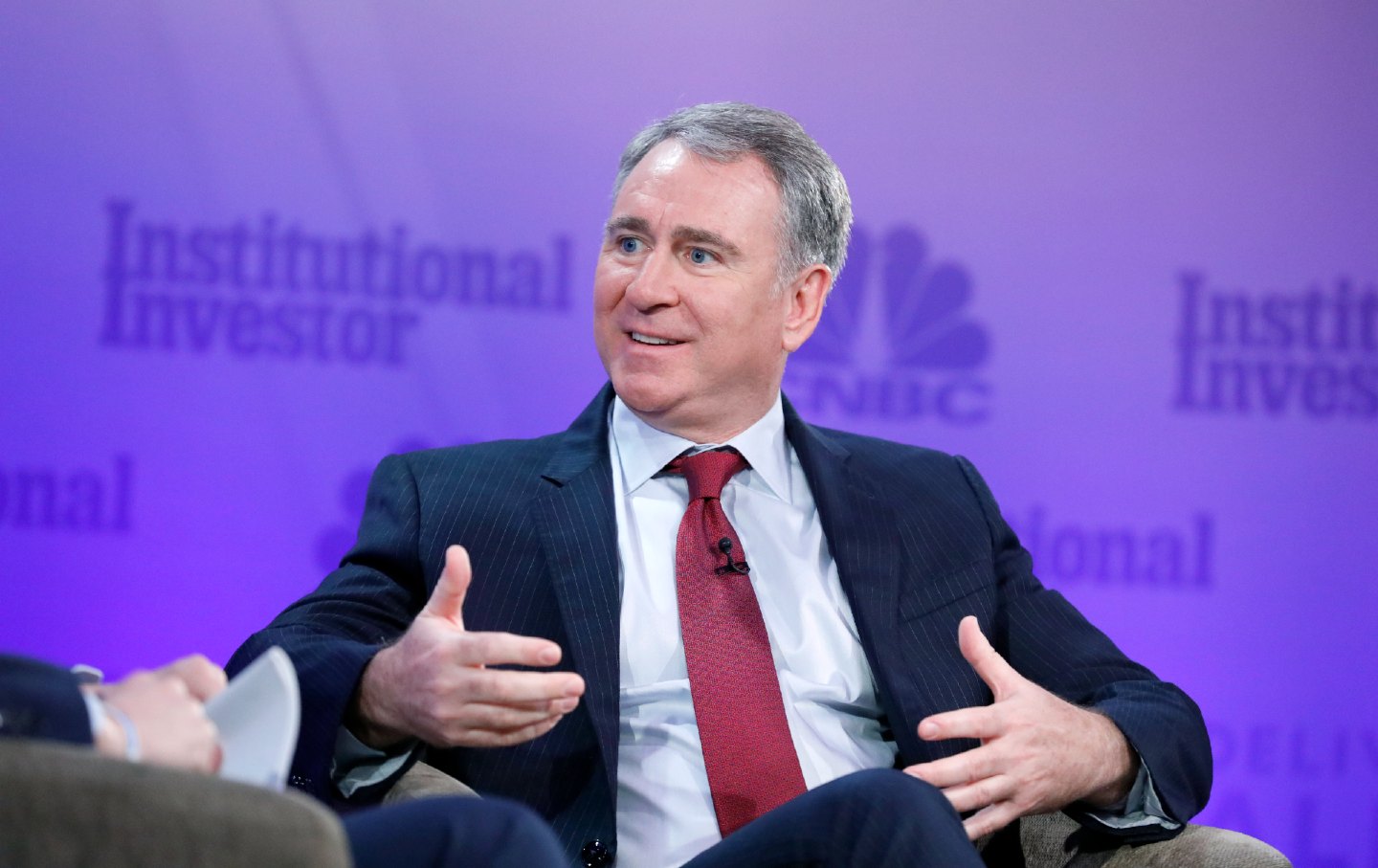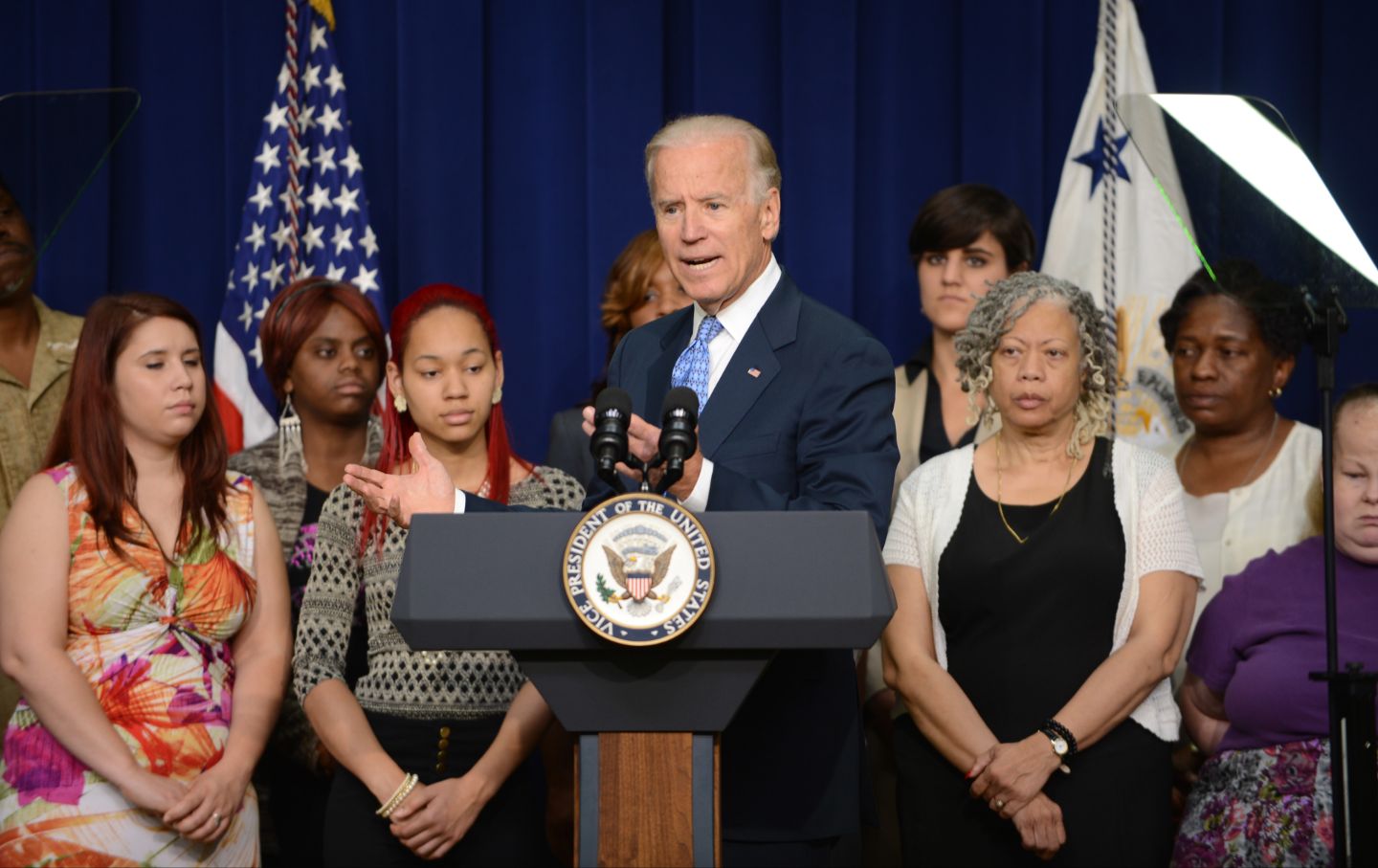The Case for Capping Wealth at $10 Million
The superrich at Davos do not deserve their hoards, and the rest of the world desperately needs those resources.

Phil White, a British millionaire, poses with a placard that reads “Tax the rich” during the World Economic Forum (WEF) annual meeting in Davos on January 18, 2023.
(Fabrice Coffrini / AFP via Getty Images)The annual meeting of the World Economic Forum (WEF) in Davos, Switzerland, began on January 15. As has become a yearly ritual, the global business and political elite have gathered to discuss how public-private partnerships can tackle what the WEF sees as the world’s most urgent problems: geopolitical instability, wars, and the consequences of AI.
Yet one issue on which the WEF has been largely silent is the extreme and growing wealth inequality. Well-meaning businesspeople do sometimes care about inequality, but they mostly understand it as a problem of poverty—not of wealth concentration. Unsurprisingly, since so many of them of are billionaires, Davos participants tend to avoid the moral and political questions raised by extreme wealth concentration.
But critics of this system, even wealthy ones, are getting louder. On January 15, Oxfam released its annual report on global wealth inequality, with the revealing title “Inequality Inc.: How Corporate Power Divides Our World and the Need for a New Era of Public Action.” And multimillionaires Stefanie Bremer and Marlene Engelhorn are in Davos to protest and deliver a letter signed by 250 millionaires in which they demand that governments tax the richest much more than they currently do.
When they argue for taxing the rich, both Oxfam and the activist millionaires typically refer to the dangers of societal instability and the harmful effects of rising inequalities. As the millionaires argue in their letter, the current economic system with its unfair tax system “has given us stagnating wages, crumbling infrastructure, failing public services, and destabilizing the very institution of democracy.”
They are right, of course. But we should oppose the concentration of wealth on even more grounds than the ones Oxfam and the activist millionaires raise in their reports.
As I argue in Limitarianism: The Case Against Extreme Wealth, there should be an upper limit to how much personal wealth any individual can have. And that limit does not lie at a billion: Instead, we should look more in the range of $10 million as a hard cap on personal wealth. And we should encourage everyone to voluntarily not keep more than they need for a decent lives—and in countries with a proper safety net, that implies not keeping more than $1 million in wealth.
Oxfam and the activist millionaires rightly sense that at some point having more money doesn’t add to a person’s quality of life and that we need to have that money invested in infrastructure and public services. They are also right about the negative effects of excess wealth on democracy. The superrich have a disproportionate influence on political parties and in Congress, given that they have the resources for campaign funding, as well as for lobbying. This has led to changes in economic policies that have increased the economic power of their corporations and allowed them to get away with paying fewer taxes. They have also bought up media—newspapers, television, Twitter—and in that way have shaped public, even if these media spread misinformation and undermine democracy.
Further, we see very many fortunes built on the exploitation of vulnerable people—often people of color and often in faraway countries, which presumably makes it easier for the shareholders who get rich to look away. We can atone for some past abuses by compensating people whose ancestors were enslaved. (This would have the added benefit of reducing some large fortunes and shrink the racial wealth gap.) Capping wealth would make it pointless to try to endlessly increase profits at the expense of the lives of the most vulnerable people, as is currently the case. But the immediate point is that much of the money on which billionaires are sitting is stained with the blood of the poor, and therefore they should not keep it.
Another reason we should limit personal wealth is that wealth concentration accelerates ecological destruction. Very wealthy people are disproportionally responsible for climate change, both because of their luxurious lifestyles and their investments in the fossil industries. While the annual emissions per person for the poorest 50 percent of the world population are less than one and a half tons of CO2 per year, the top 1 percent emits on average 101 tons per person and billionaires’ luxurious lifestyles can cause carbon footprints of several thousand tons.
The truth about climate injustice is, however, an uncomfortable one for a much larger group of people than the 1 percent. A recent study from the Stockholm Environmental Institute commissioned by Oxfam showed that the 1 percent are responsible for 16 percent of all emissions, yet the next 9 percent are also responsible for a disproportionate share—some 34 percent of all emissions. Yet, while the lesson to draw from this is that we need a new economic system as well as a shift in personal lifestyle choices to bring emissions down, there is an important difference between the 1 percent and the next 9 percent—and that is that the 1 percent are sitting on the fortunes that can address the climate crisis.
Rather than letting the ultra-rich accumulate their wealth further in polluting industries, there should be a global push to take all the surplus money that the richest do not need for their own quality of life and use it to save the lives of billions of people who will suffer from a climate breakdown that they did not cause. Since there are no signs that they are volunteering to do so, governments must force them.
These arguments have typically been used to argue for increased taxation on the superrich. But raising taxes will not be enough, since once they have acquired fortunes, most superrich will do what they can to avoid paying taxes. We must also transform the economic system (including the fiscal system) to make it impossible for anyone to become too rich.
Popular
“swipe left below to view more authors”Swipe →Excessive wealth and the extreme inequality that comes with it harm people and harm the planet. Moreover, the very wealthy have something to gain with capping wealth too, since the endless quest for money corrodes the soul.
There is one reason we should limit inequality that is independent of its harmful consequences: Extreme wealth is undeserved. For anyone who grew up in the neoliberal era in which meritocracy is the ideal, this argument might be the most difficult to grasp, given that it requires a change of perspective on human nature and society. Indeed, some of the activist millionaires who advocate higher taxation still cherish meritocracy. But let me be clear: No one deserves to be a multimillionaire. Some limited inequalities in income and wealth can be justified: those based on the amount of time one devotes to work, the burdens of the work, and if one makes exceptional efforts or takes exceptional risks. Or as an incentives-payment in case society needs more people to choose to do certain kind of work.
But none of these factors justify the inequalities that we are witnessing today. There are two factors that most influence our ability for economic success. The first factor is luck. Our parents and family, our health, impairments and talents, the people who raised and educated us: all factors that to a very large extent are beyond our control. One important source of economic wealth is completely undeserved: inheritance, as well as gifts that parents make to educational institutions and start-ups. Even the structures of markets are such that luck plays a very large role in deciding who becomes a CEO, the billionaire pop star, or makes the product that beats the competition. The second factor is the structures that previous generations have built and that allow us to economically flourish. Our economic success stands on the shoulders of investments made by previous generations and innovations initiated by governments or non-profit-seeking scientists. The superrich who worked hard can say they deserve a decent amount of money, but they cannot claim that they deserve the fortunes they currently have.
The activist millionaires might be right that the leaders in Davos and their fellow millionaires can be more easily moved by the threat of pitchforks or economic instability. Yet the reasons for massively reducing extreme wealth and limiting excessive wealth concentration are much more fundamental. Let’s hope the Davos delegates will have the guts to debate these arguments too.
More from The Nation

Why Bidenomics Was Such a Bust Why Bidenomics Was Such a Bust
A large majority of voters gave the Biden administration a failing grade on the economy. For the sake of future policy battles, it is worthwhile to try to understand their reasons...

Hickey Freeman's Next Chapter Hickey Freeman's Next Chapter
This factory in upstate New York is a testament to the lasting legacy and future of the modern labor movement.

If You Don’t Know Who Ken Griffin Is, You Should If You Don’t Know Who Ken Griffin Is, You Should
How the press keeps us in the dark about the new Gilded Age.

Millions of Workers Are Due More Overtime Pay. Will They Get It? Millions of Workers Are Due More Overtime Pay. Will They Get It?
New regulations are designed to expand the number of employees entitled to overtime. But the conservative courts have other ideas.

Ballet Dancers’ Next Move: Union Organizing Ballet Dancers’ Next Move: Union Organizing
Contract negotiations have brought higher pensions, mandated rest times, and increased wages for a job that requires intense schedules and years of training.

How Can We Wean Ourselves Off Our Country’s Military Dependency? How Can We Wean Ourselves Off Our Country’s Military Dependency?
Moving resources and skills and jobs from the military-industrial complex to civilian sectors is a big project. But it could start in your own community.


